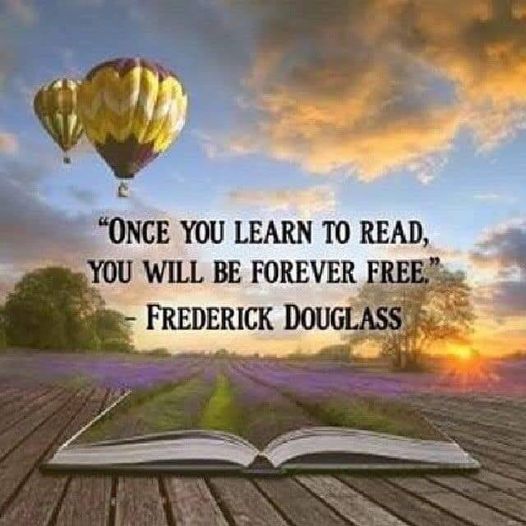#frederick douglass
Quote
There is fire in the flint and steel, but it is friction that causes it to flash, flame and burn, and give light where all else may be darkness. There is music in the violin, but the touch of the master is needed to fill the air and the soul with the concord of sweet sounds. There is power in the human mind, but education is needed for its development.
Frederick Douglass, "Blessings of Liberty and Education (1894)"
#philosophy#quotes#Frederick Douglass#Blessings of Liberty and Education#education#learning#development#growth
106 notes
·
View notes
Text
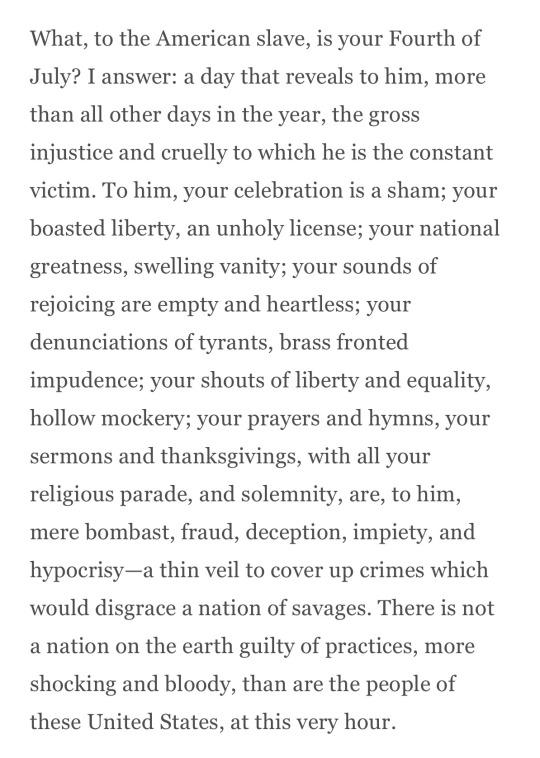
yearly required reading
3K notes
·
View notes
Text
Everyone asks what I read and truth be told I learned a lot of politics through experience and listening to Black revolutionaries.
There is nothing- nothing- that I say on my blog that Malcom X or James Baldwin or Frantz Fanon or Thomas Sankara or Frederick Douglass didn't say first (and much more eloquently)
Further, their words have given me the tools to think critically about not just my place, but everyone else's and what we owe each other.
I myself, wouldn't have a Lot of the politics I do had I not been exposed to the ideas they talked about with such knowledge and experience. Whether it was by following activists or looking up things up or learning about them myself, they're influential and I would even say foundational to decolonization and dismantling white supremacy.
My usual recs are Wretched of the Earth and Braiding Sweetgrass, but those are just starters since people just usually ask where to begin.
So I wanted to make this post and for them to be Very Much credited for the following I have and my politics since I don't often mention them.
For example, I talk a lot about how the comfort of the privileged is an obstacle that stems directly from their privilege. How libs who only conditionally support peaceful protests don't understand what's necessary; that challenging the status quo can't be done comfortably and it's never been "peaceful" for the oppressing classes. How it's detrimental to progress to compromise on how we fight for our rights and to have been liberals telling us we demand too much.
Frederick Douglass:
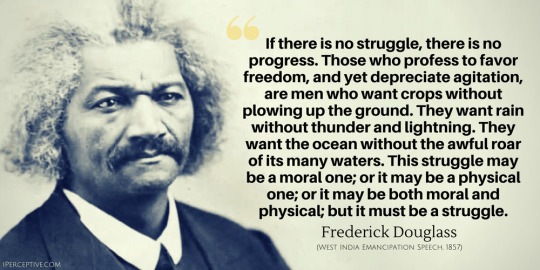
Frantz Fanon:
Privileges multiply and corruption triumphs…Today the vultures are too numerous and too voracious in proportion to the lean spoils of the national wealth. The party, a true instrument of power in the hands of the bourgeoisie, reinforces the machine, and ensures that the people are hemmed in and immobilised.
Thomas Sankara:
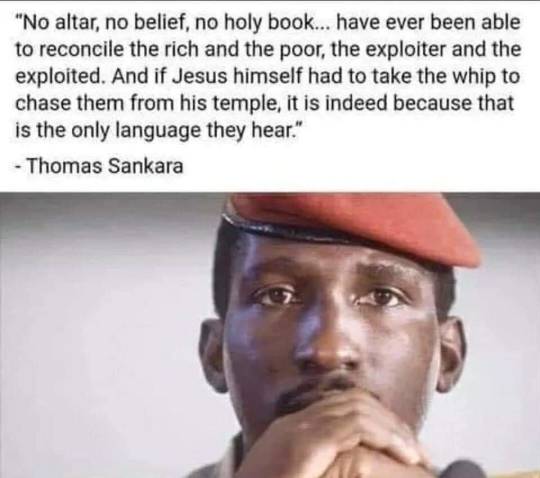
Malcom X:
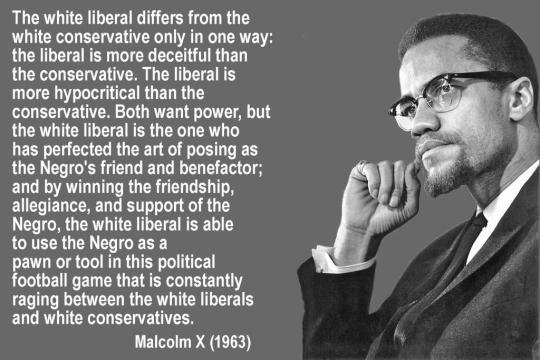
James Baldwin:
In a way, I owe the invitation to the incredible, abysmal, and really cowardly obtuseness of white liberals. Whether in private debate or in public, any attempt I made to explain how the Black Muslim movement came about, and how it has achieved such force, was met with a blankness that revealed the little connection that the liberals' attitudes have with their perceptions or their lives, or even their knowledge—revealed, in fact, that they could deal with the Negro as a symbol or a victim but had no sense of him as a man.
Bonus MLK Jr quote:
Over the last few years many Negroes have felt that their most troublesome adversary was not the obvious bigot of the Ku Klux Klan or the John Birch Society, but the white liberal who is more devoted to “order” than to justice, who prefers tranquillity to equality. In a sense the white liberal has been victimized with some of the same ambivalence that has been a constant part of our national heritage. Even in areas where liberals have great influence— labor unions, schools, churches and politics—the situation of the Negro is not much better than in areas where they are not dominant. This is why many liberals have fallen into the trap of seeing integration in merely aesthetic terms, where a token number of Negroes adds color to a white-dominated power structure."
Whether your medium is a PDF, a book, movie, clips, quotes, podcast, whatever. However you digest info easiest: learn about them and their words. Think about them. Talk about it and process it with friends.
That's how you shape your politics to be similar to the ones you find on my blog.
#malcolm x#mlk jr#thomas sankara#Frederick Douglass#frantz fanon#james baldwin#politics#human rights#justice#protests#theory#colonialism#imperialism#racism#privilege#whiteness#white supremacy#capitalism#usa#liberal#liberalism#white liberals#allies#solidarity#intersectionality
680 notes
·
View notes
Text
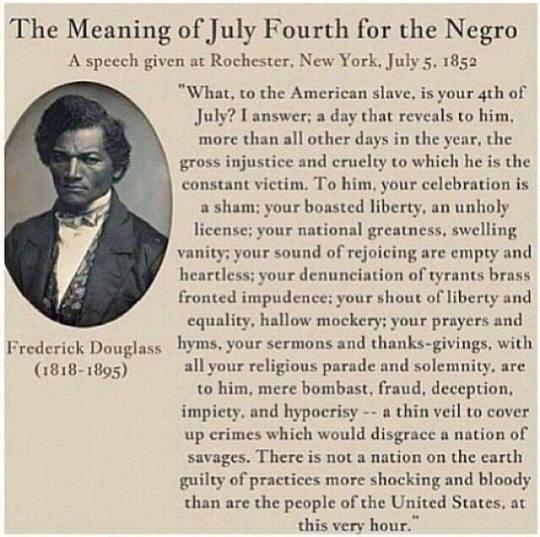
#african americans rights#african american history#underground railroad#slavery#civil war#black lives matter#civil rights movement#the narrative of the live of frederick douglass#frederick douglass#fourth of july
659 notes
·
View notes
Text

“Power concedes nothing without a demand. It never did and it never will. Find out just what any people will quietly submit to and you have found out the exact measure of injustice and wrong which will be imposed upon them, and these will continue till they are resisted with either words or blows, or with both. The limits of tyrants are prescribed by the endurance of those whom they oppress.” ― Frederick Douglass
237 notes
·
View notes
Text
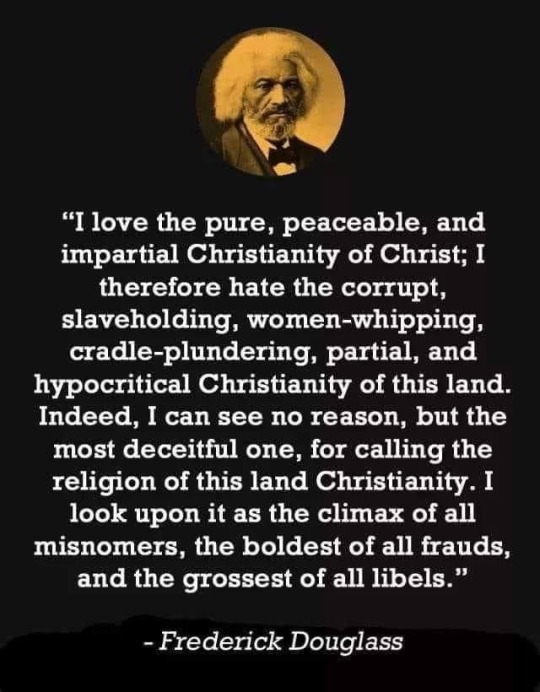
296 notes
·
View notes
Text

Simbi water spirits are revered in Hoodoo originating from Central African spiritual practices. When Africans were enslaved in the United States, they blended African spiritual beliefs with Christian baptismal practices. Enslaved African Americans prayed to Simbi water spirits during their baptismal services. In 1998, in a historic house in Annapolis, Maryland called the Brice House archaeologists unearthed Hoodoo artifacts inside the house that linked to the Kongo people. These artifacts are the continued practice of the Kongo's minkisi and nkisi culture in the United States brought over by enslaved Africans. For example, archeologists found artifacts used by enslaved African Americans to control spirits by housing spirits inside caches or nkisi bundles. These spirits inside objects were placed in secret locations to protect an area or bring harm to slaveholders. "In their physical manifestations, minkisi (nkisi) are sacred objects that embody spiritual beings and generally take the form of a container such as a gourd, pot, bag, or snail shell. Medicines that provide the minkisi with power, such as chalk, nuts, plants, soil, stones, and charcoal, are placed in the container." Nkisi bundles were found in other plantations in Virginia and Maryland. For example, nkisi bundles were found for the purpose of healing or misfortune. Archeologists found objects believed by the enslaved African American population in Virginia and Maryland to have spiritual power, such as coins, crystals, roots, fingernail clippings, crab claws, beads, iron, bones, and other items assembled together inside a bundle to conjure a specific result for either protection or healing. These items were hidden inside slaves' dwellings. These practices were concealed from slaveholders.

In Darrow, Louisiana at the Ashland-Belle Helene Plantation historians and archeologists unearthed Kongo and Central African practices inside slave cabins. Enslaved Africans in Louisiana conjured the spirits of Kongo ancestors and water spirits by using seashells. Other charms were found in several slave cabins, such as silver coins, beads, polished stones, bones, and were made into necklaces or worn in their pockets for protection. These artifacts provided examples of African rituals at Ashland Plantation. Slaveholders tried to stop African practices among their slaves, but enslaved African Americans disguised their rituals by using American materials and applying an African interpretation to them and hiding the charms in their pockets and making them into necklaces concealing these practices from their slaveholders. In Talbot County, Maryland at the Wye House plantation where Frederick Douglass was enslaved in his youth, Kongo related artifacts were found. Enslaved African Americans created items to ward off evil spirits by creating a Hoodoo bundle near the entrances to chimneys which was believed to be where spirits enter. The Hoodoo bundle contained pieces of iron and a horse shoe. Enslaved African Americans put eyelets on shoes and boots to trap spirits. Archaeologists also found small carved wooden faces. The wooden carvings had two faces carved into them on both sides which were interpreted to mean an African American conjurer who was a two-headed doctor. Two-headed doctors in Hoodoo means a conjurer who can see into the future and has knowledge about spirits and things unknown.
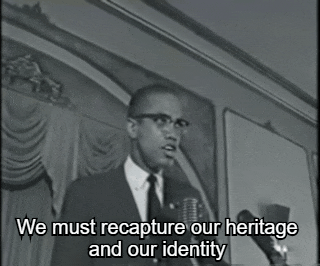
At Levi Jordan Plantation in Brazoria, Texas near the Gulf Coast, researchers suggests the plantation owner Levi Jordan may have transported captive Africans from Cuba back to his plantation in Texas. These captive Africans practiced a Bantu-Kongo religion in Cuba, and researchers excavated Kongo related artifacts at the site. For example, archeologists found in one of the cabins called the "curer's cabin" remains of an nkisi nkondi with iron wedges driven into the figure to activate its spirit. Researchers found a Kongo bilongo which enslaved African Americans created using materials from white porcelain creating a doll figure. In the western section of the cabin they found iron kettles and iron chain fragments. Researchers suggests the western section of the cabin was an altar to the Kongo spirit Zarabanda
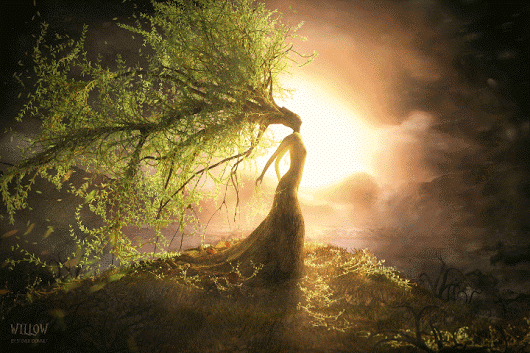
#zarabanda#bilongo#nkisi nkondi#bantu kongo#cuba#texas#levi jordan#african#afrakan#kemetic dreams#africans#african culture#afrakan spirituality#afrakans#frederick douglass#Ashland-Belle Helene Plantation#Darrow#Louisiana#simbi#water#water spirit#baptism#christianity#christian broadcasting network#christian living#christian doctrine#christian faith#hoodoo#vodun#voodoo
171 notes
·
View notes
Text
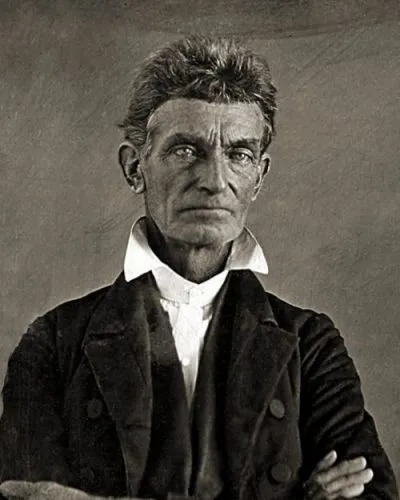
"But the question is, Did John Brown fail? He certainly did fail to get out of Harpers Ferry before being beaten down by United States soldiers; he did fail to save his own life, and to lead a liberating army into the mountains of Virginia. But he did not go to Harpers Ferry to save his life.
"The true question is, Did John Brown draw his sword against slavery and thereby lose his life in vain? And to this I answer ten thousand times, No! No man fails, or can fail, who so grandly gives himself and all he has to a righteous cause. No man, who in his hour of extremest need, when on his way to meet an ignominious death, could so forget himself as to stop and kiss a little child, one of the hated race for whom he was about to die, could by any possibility fail.
"Did John Brown fail? Ask Henry A. Wise in whose house less than two years after, a school for the emancipated slaves was taught.
"Did John Brown fail? Ask James M. Mason, the author of the inhuman fugitive slave bill, who was cooped up in Fort Warren, as a traitor less than two years from the time that he stood over the prostrate body of John Brown.
"Did John Brown fail? Ask Clement C. Vallandingham, one other of the inquisitorial party; for he too went down in the tremendous whirlpool created by the powerful hand of this bold invader. If John Brown did not end the war that ended slavery, he did at least begin the war that ended slavery. If we look over the dates, places and men for which this honor is claimed, we shall find that not Carolina, but Virginia, not Fort Sumter, but Harpers Ferry, and the arsenal, not Col. Anderson, but John Brown, began the war that ended American slavery and made this a free Republic. Until this blow was struck, the prospect for freedom was dim, shadowy and uncertain. The irrepressible conflict was one of words, votes and compromises.
"When John Brown stretched forth his arm the sky was cleared. The time for compromises was gone - the armed hosts of freedom stood face to face over the chasm of a broken Union - and the clash of arms was at hand. The South staked all upon getting possession of the Federal Government, and failing to do that, drew the sword of rebellion and thus made her own, and not Brown's, the lost cause of the century."
-(May 30, 1881, Frederick Douglass, oration at the Fourteenth Anniversary of Storer College, May 30, 1881)
283 notes
·
View notes
Text
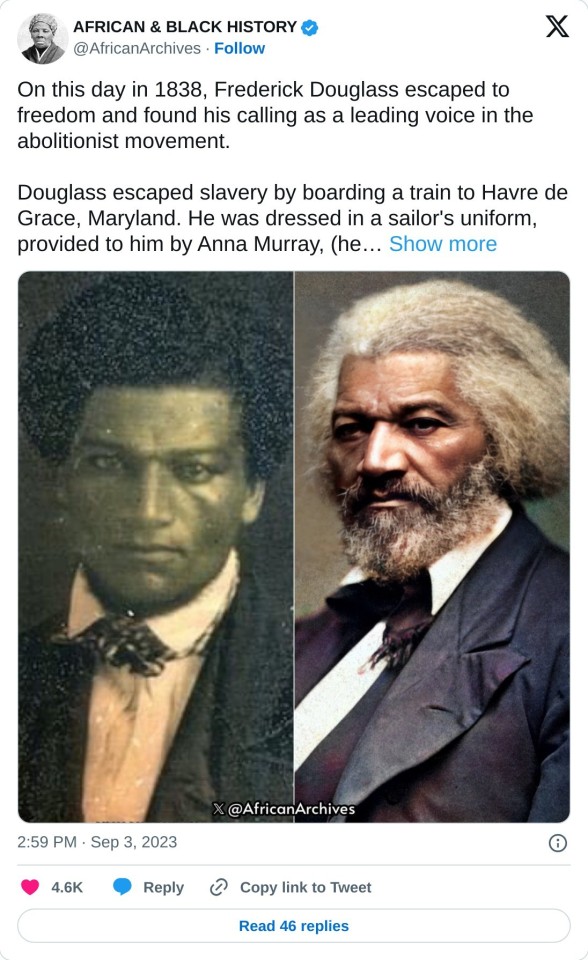
On this day in 1838, Frederick Douglass escaped to freedom and found his calling as a leading voice in the abolitionist movement. Douglass escaped slavery by boarding a train to Havre de Grace, Maryland.
He was dressed in a sailor's uniform, provided to him by Anna Murray, (he married her 12 days later, she was a free Black woman in Baltimore) she also gave him part of her savings to cover his travel costs, and carried identification papers which he had obtained from a free black seaman. He crossed the Susquehanna River by ferry at Havre de Grace, then continued by train to Wilmington, Delaware.
From there he went by steamboat to "Quaker City" (Philadelphia, Pennsylvania) and continued to the safe house of abolitionist David Ruggles in New York; the whole journey took less than 24 hours. Frederick Douglass later wrote of his arrival in New York: "I have often been asked, how I felt when first I found myself on free soil. And my readers may share the same curiosity. There is scarcely anything in my experience about which I could not give a more satisfactory answer.
A new world had opened upon me. If life is more than breath, and the 'quick round of blood,' I lived more in one day than in a year of my slave life. It was a time of joyous excitement which words can but tamely describe.
In a letter written to a friend soon after reaching New York, I said: 'I felt as one might feel upon escape from a den of hungry lions.' Anguish and grief, like darkness and rain, may be depicted; but gladness and joy, like the rainbow, defy the skill of pen or pencil."
Frederick Douglass first tried to escape from Freeland, who had hired him out from his owner Colonel Lloyd, but was unsuccessful. In 1836, he tried to escape from his new owner Covey, but failed again. In 1837, Douglass met and fell in love with Anna Murray, her freedom strengthened his belief in the possibility of his own.
Once he had arrived, he sent for Murray to follow him to New York; she arrived with the necessary basics for them to set up home. They were married on September 15, 1838, by a black Presbyterian minister eleven days after his arrival in New York.
387 notes
·
View notes
Text
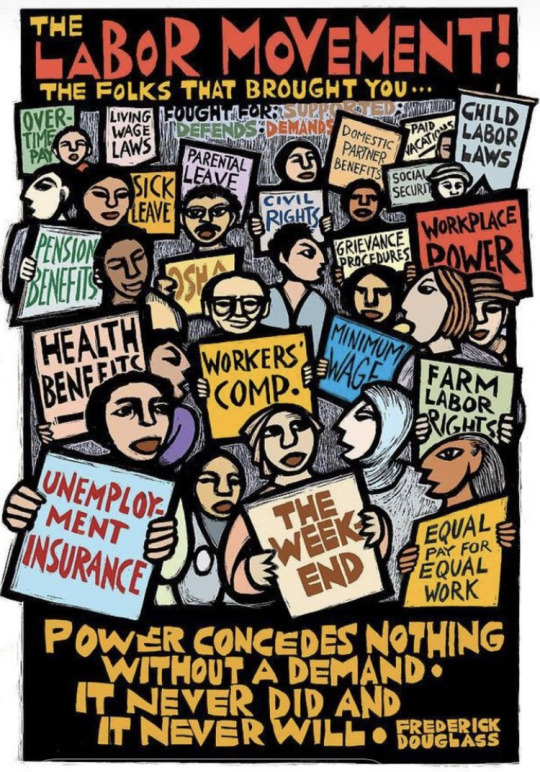
#frederick douglass#labor day#may day#labor rights#human rights#relevant#communism#socialism#anarchism#capitalism#blacklivesmatter#fascisim#feminism#poster#poster art#working class#art#uncredited#anonymous
436 notes
·
View notes
Text
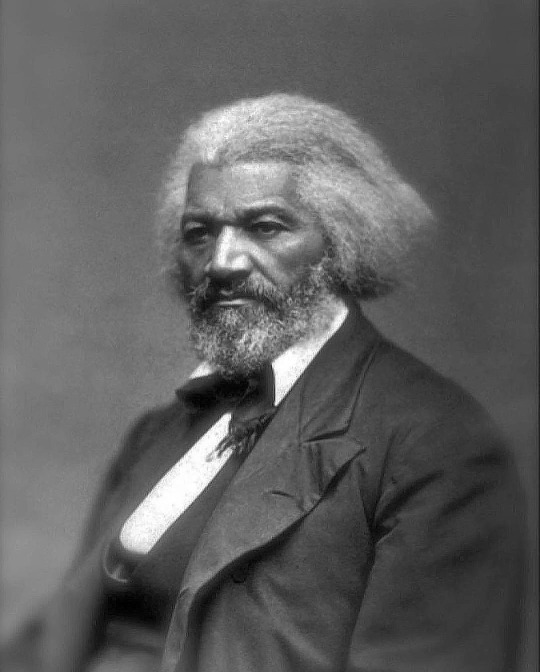
Today In History
Frederick Douglass was born around 1818 into slavery in Talbot County, Maryland. As was often the case with slaves, the exact year and date of Douglass’ birth are unknown, though later in life he chose to celebrate it on February 14.
In his journey from captive slave to internationally renowned activist, Frederick Douglass has been a source of inspiration and hope for millions of African Americans.
His brilliant words and brave actions continue to shape the ways that we think about race, democracy, and the meaning of freedom.
“The rich inheritance of justice, liberty, prosperity and independence, bequeathed by your fathers, is shared by you, not by me. The sunlight that brought life and healing to you, has brought stripes and death to me. This Fourth of July is yours, not mine. You may rejoice, I must mourn.” - insert from Frederick Douglass, “What, To The Slave, Is The Fourth Of July.”
He was the most photographed American of the nineteenth century.
CARTER™️ Magazine
#frederick douglass#carter magazine#carter#historyandhiphop365#wherehistoryandhiphopmeet#history#cartermagazine#today in history#staywoke#blackhistory#blackhistorymonth
88 notes
·
View notes
Quote
Poets, prophets, and reformers are all picture-makers — and this ability is the secret of their power and of their achievements. They see what ought to be by the reflection of what is, and endeavor to remove the contradiction.
Frederick Douglass, "Pictures and Progress (1864-65)"
#philosophy#quotes#Frederick Douglass#Pictures and Progress#poets#artists#writers#progress#change#images#creativity#awareness
500 notes
·
View notes
Text

Happy birthday, Frederick Douglass! (February 14, 1818)*
*Douglass’ actual date of birth is unknown, but he chose to celebrate his birth on the 14th.
A fiery and articulate voice of the abolitionist movement, Frederick Douglass was one of the most important leaders of the movement in the years leading up to the Civil War. Born into slavery in Maryland, Douglass experienced an early life of brutality and cruelty, serving several masters before escaping slavery in 1838, making his way to New York City. Douglass became well-read and well-spoken, making a name for himself as an activist and agitator. Douglass published his autobiography, which was acclaimed and widely-read, and the abolitionist newspaper known as the North Star. Douglass associated with abolitionists such as John Brown, as well as the early figures of the women’s rights movements. After the Civil War, Douglass continued to agitate for equality for Black Americans and women, and in 1872 was the first Black man nominated for Vice President, on the ticket of the Equal Rights Party. Douglass continued his activism into the final years of his life, always supportive of equal rights for Black people and for women, and an ally of anti-colonial struggles. He would die in 1895, leaving behind a wealth of writings and speeches which continue to inspire and influence activists to this day.
"If there is no struggle, there is no progress. Those who profess to favor freedom, and yet depreciate agitation, are men who want crops without plowing up the ground. They want rain without thunder and lightning. They want the ocean without the awful roar of its many waters. This struggle may be a moral one; or it may be a physical one; or it may be both moral and physical; but it must be a struggle. Power concedes nothing without a demand. It never did and it never will. Find out just what any people will quietly submit to, and you have found out the exact amount of injustice and wrong which will be imposed upon them; and these will continue till they are resisted with either words or blows, or with both."
578 notes
·
View notes
Text
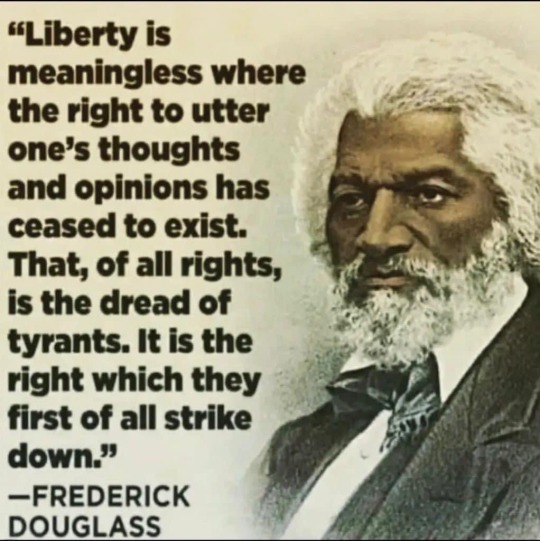
1K notes
·
View notes
Quote
It's easier to build strong children then repair broken men.
Frederick Douglass
#Frederick Douglass#thepersonalwords#Deep#quotes#literature#life quotes#author quotes#prose#lit#spilled ink#writers on tumblr#writing inspiration#poets on tumblr
74 notes
·
View notes
